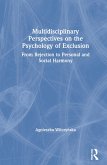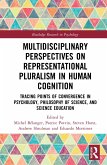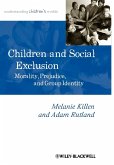This new volume considers one of the most pressing topics of the generation: the sense of social exclusion, rejection and loneliness experienced by many adolescents and young adults. It offers insights from psychological and biochemical research, explaining the role of the brain, mind and body in the development of a sense of belonging over the lifespan. Illustrated with examples of the consequences of exclusion drawn from the author's clinical work, this important work surveys the latest research in the field and introduces an innovative framework for understanding the development of a sense of belonging. Wilczy¿ska considers the effects of social exclusion, exploring its consequences for mental health, particularly amongst young people, and reveals how transgenerational trauma imprinted at the early stages of human development impacts lifelong development. Including a foreword by Philip Zimbardo, Multidisciplinary Perspectives on the Psychology of Exclusion is essential reading for students and researchers of developmental psychology, social psychology and sociology. It will also be of interest to practitioners and policymakers working with children and young people to understand and mitigate the effects of social exclusion and loneliness.
Hinweis: Dieser Artikel kann nur an eine deutsche Lieferadresse ausgeliefert werden.
Hinweis: Dieser Artikel kann nur an eine deutsche Lieferadresse ausgeliefert werden.








